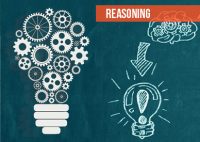Alpha Numeric For SBI PO Set – 56

Alpha Numeric For SBI PO Set – 56
1) Study the following arrangement carefully and answer the given questions.
PLY SET RID ANY TWO the new word after performing the mentioned operations may or may not be meaningful english word.
If in each of the given words , each of the consonants is changed to the previous letter and each vowel is changed to the next letter as per the english alphabetical order, in how many words thus formed will no vowel appear?
a) Five
b) Three
c) Two
d) One
e) Four
2) Study the following arrangement carefully and answer the given questions.
PLY SET RID ANY TWO the new word after performing the mentioned operations may or may not be meaningful english word.
If the first alphabet in each of the word is changed to next alphabet as per the english alphabetical order, how many words having more than one vowel(same or different vowels) will be formed?
a) Four
b) Three
c) Two
d) One
e) None
3) Study the following arrangement carefully and answer the given questions.
PLY SET RID ANY TWO the new word after performing the mentioned operations may or may not be meaningful english word.
If the given words are arranged in the words are arranged in the order as they would appear in a dictionary from left to right, which of the following will be fourth from the right?
a) TWO
b) PLY
c) SET
d) RID
e) ANY
4) Study the following arrangement carefully and answer the given questions.
PLY SET RID ANY TWO the new word after performing the mentioned operations may or may not be meaningful english word.
How many letters are there in the english alphabetical order between the first letter of the word which is second from the right and second letter of the word which is second from the left of the given words?
a) Two
b) Three
c) Nine
d) Six
e) Five
5) Study the following arrangement carefully and answer the given questions.
PLY SET RID ANY TWO the new word after performing the mentioned operations may or may not be meaningful english word.
If each letter in each word is arranged in alphaetical order (within the word) , how many words will remain unchanged as compared to the original set of words?
a) four
b) two
c) three
d) one
e) None
6) To answer these questions study the following arrangement:
J Y 2 = s £ δ E G M * 7 $ H P 9 K L β @ W Q 1 3 # C D ©
How many such letters are three each of which is either immediate followed by a number or immediately preceded by a symbol, but not both?
a) 4
b) 5
c) 6
d) 7
e) None of these
7) To answer these questions study the following arrangement:
J Y 2 = s £ δ E G M * 7 $ H P 9 K L β @ W Q 1 3 # C D ©
How many such numbers are there each of which is either immediately followed by a symbol or immediately preceded by a letters, but not both?
a) 2
b) 4
c) 3
d) 5
e) None of these
8) To answer these questions study the following arrangement:
J Y 2 = s £ δ E G M * 7 $ H P 9 K L β @ W Q 1 3 # C D ©
How many such symbols are there in the above arrangement each of which is either immediately followed by a number or immediately preceded by a letter, but not both?
a) Nil
b) 1
c) 2
d) 3
e) None of these
9) To answer these questions study the following arrangement:
J Y 2 = s £ δ E G M * 7 $ H P 9 K L β @ W Q 1 3 # C D ©
Four of the following five are alike in a certain way based on the positions of the elements in the above arrangement and hence form a group. Which one does not belong to the group?
a) 2YCD
b) £ S13
c) JS©3
d) £ E1W
e) =#2C
10) To answer these questions study the following arrangement:
J Y 2 = s £ δ E G M * 7 $ H P 9 K L β @ W Q 1 3 # C D ©
2YS is to EG£ in the same way as PHK is to ______
a) @WL
b) WQβ
c) @βQ
d) @WK
e) None of these


